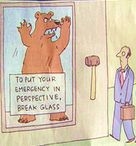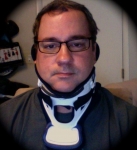From NY Times Dec. 3rd
Insomnia Is Linked to Trouble Breathing
Subtle breathing problems during sleep may play a larger role in causing insomnia than the usual suspects, like stress and the need for a bathroom, a small study of poor sleepers suggests.
The report, published in the current issue of the journal Sleep, found that chronic insomniacs woke an average of about 30 times a night, and that a brief respiratory problem — a drop in the volume of oxygen inhaled, due to a narrowed airway, for instance — preceded about 90 percent of those interruptions. None of the people had any idea they had breathing problems during sleep.
The study is hardly conclusive, experts said, because it included only 20 people and had no control group of normal sleepers for comparison. But these experts said that it was worth following up, because it challenged the predominant theory of insomnia as a problem of “hyper-arousal,” in which the body idles on high psychologically and physiologically. Earlier studies have linked measures of hyper-arousal to delays in falling asleep and problems nodding off after interruptions. But the theory does not satisfactorily explain what prompts awakenings in the first place.
The new study compared chronic insomniacs’ opinions about why they awoke at night with data from a sleep test monitoring breathing and brain waves — and does provide a possible explanation.
“It is a striking finding that by no means can be discounted,” said Dr. Michael J. Sateia, a professor of psychiatry and sleep medicine at Dartmouth College’s school of medicine, who was not involved in the research. Still, he added, “we know arousal can in and of itself promote instability of the upper airway,” and it is not always clear which comes first.
Dr. Sateia co-wrote an editorial accompanying the study, with Wilfred R. Pigeon, of the Canandaigua VA Medical Center, in Canandaigua, N.Y.
In the study, sleep researchers in Albuquerque interviewed 20 men and women with chronic insomnia, asking about the causes of their nightly awakenings. The people all sought help at Maimonides Sleep Arts and Sciences, a private clinic. None showed signs of having a breathing disorder like sleep apnea, or sleep-disordered breathing, a milder form. Most were taking sleep pills.
The group members attributed most of their awakenings to nightmares, a need for the bathroom, pain or “racing thoughts.”
But their sleep told a different story. The participants each spent a night at the sleep clinic, wired to sensors that tracked brain waves and breathing. Researchers charted every awakening, when brain waves shifted to a waking state for at least 16 seconds, and every breathing issue causing oxygen intake to dip well below normal.
“Almost all of the awakenings turned out to be preceded within a second by an abnormal breathing process — which led to the awakening,” said Dr. Barry Krakow, medical director of the Maimonides clinic and its research arm, the Sleep and Human Health Institute.
Dr. Krakow’s co-authors were Victor A. Ulibarri and Shara Kikta, both of Maimonides; and Edward Romero, a third-year student at the University of New Mexico School of Medicine.
Sleep medicine specialists usually treat insomnia with talk therapy intended to unwind people’s mistaken, and often subconscious, assumptions about sleeping. These include thinking of sleep as an exercise in frustration and approaching the bed with performance anxiety. Medications can help, too, but rarely resolve the underlying problems.
The new finding, if replicated, suggests that breathing disorders may be an underappreciated cause of insomnia and treatment of those problems could help. Doctors can prescribe dental inserts to keep airways open during sleep, or in more extreme cases, a “positive airway pressure” machine, known as a CPAP.
Such sleep therapies can run into the thousands of dollars and are not always covered by insurers. “A larger, controlled replication study would not only clarify the central question of whether” breathing problems are common in insomniacs, Dr. Sateia and Dr. Pigeon wrote in their editorial, but “perhaps even change reimbursement policies.”
Insomnia Is Linked to Trouble Breathing
- Sir NoddinOff
- Posts: 4190
- Joined: Mon May 14, 2012 5:30 pm
- Location: California
Re: Insomnia Is Linked to Trouble Breathing
I found with my earlier nocturnia that anxiety played a big role in my getting up to pee all night. I'd feel that sudden catch in my throat as I started to snore and it'd set off a whole cascade of bad reactions, fight or flight (call it what you may). Whatever it was, it kept me awake a lot more than I wanted. Anyway, now when I go to bed using CPAP, I feel more relaxed and fall asleep faster. I still wake up once or twice to pee or adjust the blankets or whatever, but it's nowhere nearly as bad as it used to be. Thanks for the post, Julie
_________________
| Mask: AirFit™ F10 Full Face Mask with Headgear |
| Additional Comments: Sleepyhead software v.0.9.8.1 Open GL and Encore Pro v2.2. |
I like my ResMed AirFit F10 FFM - reasonably low leaks for my ASV therapy. I'm currently using a PR S1 AutoSV 960P Advanced. I also keep a ResMed S9 Adapt as backup. I use a heated Hibernite hose. Still rockin' with Win 7 by using GWX to stop Win 10.
-
sleepnasta
- Posts: 188
- Joined: Sat Nov 03, 2012 4:03 pm
Re: Insomnia Is Linked to Trouble Breathing
that was my experience too. before cpap i felt a lot of anxiety about going to sleep and could never understand it. just as i would be drifting to sleep i'd get a strange jolt, often sit up in bed not knowing what was happening other than a general feeling of unease. my diagnoses of severe OSA really shed a light on those feelings and with cpap i find that i'm a lot more relaxed going to bed.Sir NoddinOff wrote:I found with my earlier nocturnia that anxiety played a big role in my getting up to pee all night. I'd feel that sudden catch in my throat as I started to snore and it'd set off a whole cascade of bad reactions, fight or flight (call it what you may). Whatever it was, it kept me awake a lot more than I wanted. Anyway, now when I go to bed using CPAP, I feel more relaxed and fall asleep faster. I still wake up once or twice to pee or adjust the blankets or whatever, but it's nowhere nearly as bad as it used to be. Thanks for the post, Julie
Diagnosed with OSA October 2012
Re: Insomnia Is Linked to Trouble Breathing
I can agree with this as in my case also. [Edit]: Although my situation is considered "Mild" OSA with more leaning towards a higher RDI thus likely UARS related condition.sleepnasta wrote:that was my experience too. before cpap i felt a lot of anxiety about going to sleep and could never understand it. just as i would be drifting to sleep i'd get a strange jolt, often sit up in bed not knowing what was happening other than a general feeling of unease. my diagnoses of severe OSA really shed a light on those feelings and with cpap i find that i'm a lot more relaxed going to bed.Sir NoddinOff wrote:I found with my earlier nocturnia that anxiety played a big role in my getting up to pee all night. I'd feel that sudden catch in my throat as I started to snore and it'd set off a whole cascade of bad reactions, fight or flight (call it what you may). Whatever it was, it kept me awake a lot more than I wanted. Anyway, now when I go to bed using CPAP, I feel more relaxed and fall asleep faster. I still wake up once or twice to pee or adjust the blankets or whatever, but it's nowhere nearly as bad as it used to be. Thanks for the post, Julie
_________________
| Mask: Swift™ FX Nasal Pillow CPAP Mask with Headgear |
| Additional Comments: SleepyHead & Encore Basic Software & a Zeo |
 .....................................................
..................................................... Press ESC if the animations BUG you!.....................................................
Press ESC if the animations BUG you!.....................................................
- chunkyfrog
- Posts: 34545
- Joined: Mon Jul 12, 2010 5:10 pm
- Location: Nowhere special--this year in particular.
Re: Insomnia Is Linked to Trouble Breathing
I used to stay up ridiculously late and get up insanely early, because sleep was such an ordeal, I dreaded it.
Now, it's all good. I don't even feel bad about toddling off at the beginning of the 10:00 news.
Now, it's all good. I don't even feel bad about toddling off at the beginning of the 10:00 news.
_________________
| Mask: AirFit™ P10 For Her Nasal Pillow CPAP Mask with Headgear |
| Additional Comments: Airsense 10 Autoset for Her |
- john.michael
- Posts: 81
- Joined: Fri Feb 25, 2011 11:28 pm
Re: Insomnia Is Linked to Trouble Breathing
Insomnia was the Aston I went to the sleep doctor. I had no idea I had apnea.
_________________
| Mask: Quattro™ FX Full Face CPAP Mask with Headgear |
| Additional Comments: Philips SystemOne BiPAP replaced VPAP Adapt SV machine and ResScan 3.13, serial/null modem cable WinXP |
Mask - Quattro FX
Machine - ResMed AirCurve 10 ASV
Machine - ResMed AirCurve 10 ASV
- zoocrewphoto
- Posts: 3732
- Joined: Mon Apr 30, 2012 10:34 pm
- Location: Seatac, WA
Re: Insomnia Is Linked to Trouble Breathing
Sir NoddinOff wrote:I found with my earlier nocturnia that anxiety played a big role in my getting up to pee all night. I'd feel that sudden catch in my throat as I started to snore and it'd set off a whole cascade of bad reactions, fight or flight (call it what you may). Whatever it was, it kept me awake a lot more than I wanted. Anyway, now when I go to bed using CPAP, I feel more relaxed and fall asleep faster. I still wake up once or twice to pee or adjust the blankets or whatever, but it's nowhere nearly as bad as it used to be. Thanks for the post, Julie
Similar for me too. I fall asleep a lot faster than I used to. Seems like within a couple minutes as I usually don't remember anything. I still wake up during the night, but not as much as pre cpap, and usually it is just to roll over or readjust.
I am a bad sleeper in hotels, slow to all asleep, waking up frequently, often at least once an hour, and just plain being awake too much. I always blamed this on the strange bed, trying to go to bed earlier, etc. But now, I fall asleep quickly and usually have one bathroom trip and maybe a couple small wake ups. Nothing like the all night wake up ordeals of the past.
_________________
| Mask: Quattro™ FX Full Face CPAP Mask with Headgear |
| Humidifier: S9™ Series H5i™ Heated Humidifier with Climate Control |
| Additional Comments: Resmed S9 autoset pressure range 11-17 |
Who would have thought it would be this challenging to sleep and breathe at the same time?
- retrodave15
- Posts: 402
- Joined: Sun Nov 13, 2011 1:56 pm
- Location: Newark, OH
Re: Insomnia Is Linked to Trouble Breathing
This is how I felt before CPAP, I went to the Doc to talk about insomnia and depression. The first thing he did was refer me to a sleep doc and scheduled a sleep study!
_________________
| Mask: Swift™ FX Nasal Pillow CPAP Mask with Headgear |
| Additional Comments: Sleepy Head for Mac, Miami J C- Collar for post C-Spine Surgery recovery |
Dave
Event Planner / Trade show Manager / Driver of the Winnebago
Newark, Ohio
Wife's Equipment: PRS1 AutoIQ w/ Cflex+, Swift FX for Her
Event Planner / Trade show Manager / Driver of the Winnebago
Newark, Ohio
Wife's Equipment: PRS1 AutoIQ w/ Cflex+, Swift FX for Her















